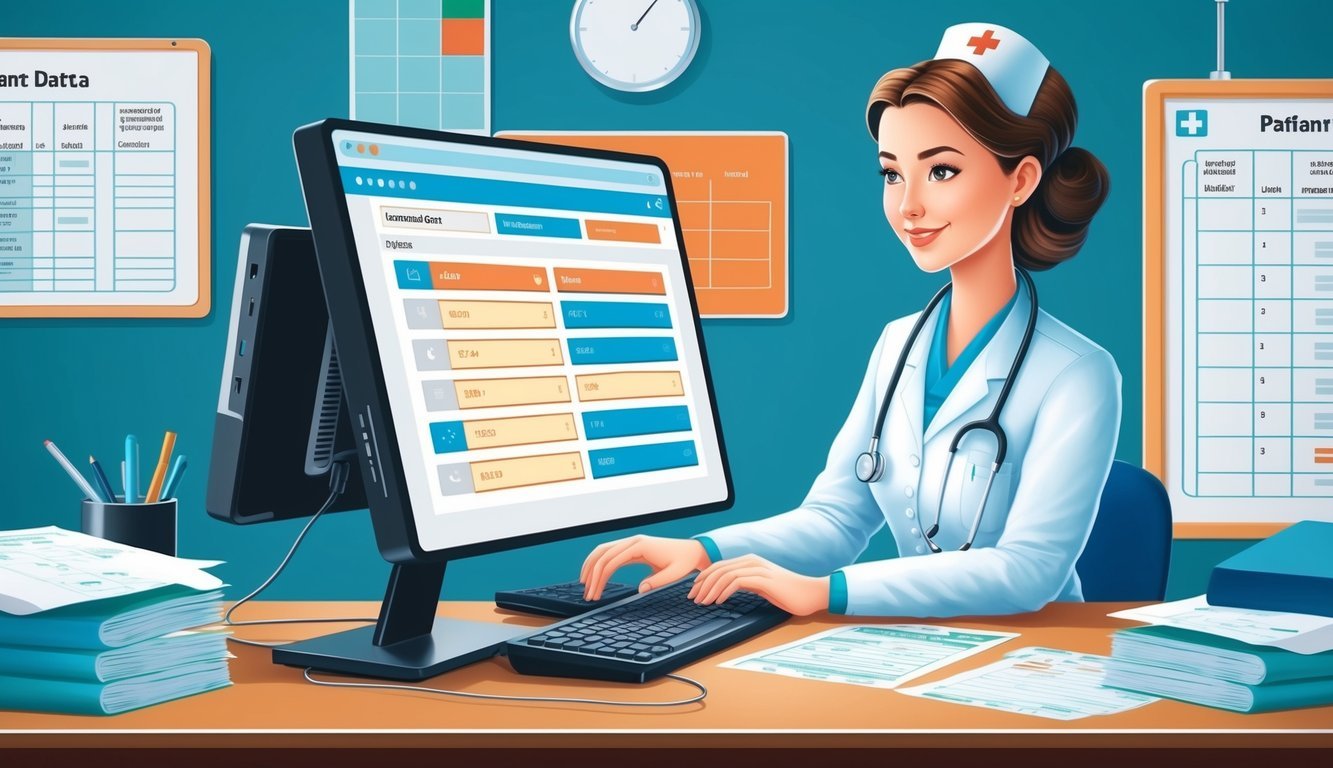The nursing field offers various pathways for professionals seeking to advance their careers.
Many individuals wonder about the relationships and distinctions between an MSN, a BSN, and an RN.
Understanding these acronyms is crucial for shaping your nursing career and selecting the right educational path that suits your goals.
As you explore opportunities in nursing, you’ll find that a Bachelor of Science in Nursing (BSN) serves as the foundation for your practice.
Pursuing a Master of Science in Nursing (MSN) enables you to specialize in areas such as advanced practice, nursing education, or administration.
Registered Nurses (RNs) can take these steps to elevate their qualifications and improve patient care in diverse healthcare settings.
Advancing your education can open doors to exciting roles in public health and nursing specialties.
By understanding the dynamics between an MSN, BSN, and RN, you can better position yourself for success in the nursing profession.
Key Takeaways
- An MSN degree allows for specialization and advanced roles in nursing.
- A BSN is essential for a strong foundational nursing education.
- RNs can choose different pathways to enhance their careers in nursing.
Pathways to Advancement in Nursing

Advancing in nursing involves clear educational pathways.
You can move from Registered Nurse (RN) to a Bachelor of Science in Nursing (BSN), or further to a Master of Science in Nursing (MSN).
Both pathways open new career opportunities and responsibilities.
From RN to BSN
Transitioning from RN to BSN enhances your qualifications.
Many hospitals now prefer or require a BSN for nursing positions.
This advanced degree gives you greater clinical skills and leadership training.
Key Considerations:
- Program Length: Typical programs take 1-2 years.
- Transfer Credits: Many colleges accept previous nursing credits, shortening the time needed.
- Admission Requirements: Generally include a valid RN license and a minimum GPA.
Programs are often offered online, allowing you to balance work and study.
Explore programs like RN to BSN for flexibility.
Continuing Education: MSN
If you aim for advanced clinical roles or leadership, consider the RN to MSN pathway.
This program allows you to earn your MSN directly from your RN status, typically in 3-4 years.
Key Advantages:
- Specializations: Choose areas like nurse education, administration, or clinical practice.
- Accreditation: Look for CCNE-accredited programs for quality assurance.
- Accelerated Options: Some schools offer accelerated RN to MSN programs for quicker completion.
Admission often requires a bachelor’s degree or RN experience.
Online options are prevalent, giving you the flexibility to advance professionally without disrupting work.
Nursing Specialties and Advanced Practice

Nursing offers a variety of specialized roles that enhance patient care and healthcare outcomes.
Understanding these roles can help you navigate your career path effectively and take advantage of advanced practice opportunities.
Specialized Nursing Roles
Specialized nursing roles focus on specific patient populations and healthcare needs.
These roles often require advanced education and training.
Here are some key specialties:
-
Adult-Gerontology Primary Care Nurse Practitioner (AGPCNP): Works with adults across various settings, including primary care and long-term care. They focus on health promotion and disease prevention.
-
Psychiatric Mental Health Nurse Practitioner (PMHNP): Provides mental health care to patients of all ages. This role emphasizes evidence-based practices to manage mental health issues.
-
Clinical Nurse Specialist (CNS): An expert in a specific area of clinical practice, offering guidance and education within healthcare teams.
These roles each require national certification, which ensures you meet the necessary standards.
Advanced Clinical Practices
Advanced clinical practices allow you to play a crucial role in patient care and healthcare leadership.
You can take on responsibilities such as:
-
Clinical Nurse Leader (CNL): Focuses on patient care coordination and quality improvement. The CNL integrates evidence-based practices to enhance clinical decision-making.
-
Nurse Educator: Teaches nursing students and practicing nurses about current best practices. This role is vital for shaping the future of nursing.
-
Nursing Management: Involves leading a team of nurses, ensuring effective patient care delivery and supporting professional development.
These advanced practices require strong clinical skills and leadership capabilities, enabling you to influence patient outcomes significantly.
Integrating Nursing Informatics

Nursing informatics plays a crucial role in enhancing patient care and improving healthcare systems.
By leveraging data and technology, you can drive innovation and ensure quality outcomes in your practice.
Innovation in Patient Care
Nursing informatics allows you to utilize data to improve patient outcomes.
Through applied healthcare statistics, you can identify trends and make informed decisions.
For instance, analyzing patient data can highlight areas needing improvement.
You may also engage in interprofessional collaboration.
This involves working with other healthcare providers to share insights and develop care plans that are data-driven.
With robust informatics system analysis, you can better coordinate care, leading to more precise monitoring of patient responses.
Moreover, your skills in data science and analytics can help you create more effective patient education materials.
This personal touch enhances patient engagement, empowering them to participate in their own care actively.
Impact on Healthcare Systems
Integrating nursing informatics into healthcare systems can revolutionize how care is delivered.
With proper use of analytics, you can evaluate healthcare quality metrics that improve service delivery.
Additionally, maintaining compliance with healthcare policy is essential.
By understanding the regulations, you can ensure your practice meets established standards, reducing potential legal liabilities.
Incorporating informatics also fosters a culture of continuous improvement within healthcare organizations.
You can use data to track progress, identify bottlenecks, and streamline processes, all leading to better organizational efficiency.
Through sustained focus on these areas, you contribute to a more responsive and effective healthcare environment where patient-centered care is the norm.
Educational Preparation and Professional Development

In today’s healthcare landscape, effective educational preparation and ongoing professional development are key to success in nursing.
Focusing on curriculum and instructional design paired with strong leadership and communication skills will help you excel in your role.
Curriculum and Instruction
Your educational journey in nursing often begins with a solid foundation in a Master’s Degree in Nursing.
This program typically includes courses on contemporary curriculum design and curriculum development.
A strong curriculum will prepare you to handle complex patient care needs.
This is especially crucial when transitioning from roles like LPN to RN or CNS.
Key areas of focus often include:
- Cross-Cultural Communication: Understanding diverse patient backgrounds.
- Writing Strategies: Developing effective documentation and communication skills.
- Composition: Learning how to convey complex information clearly.
These competencies are essential for delivering high-quality care and enhancing your professional skills.
Leadership and Communication
Leadership in nursing is about guiding your team while effectively communicating with patients and other healthcare professionals.
Your education should equip you with important skills to lead and inspire others.
As you advance, focus on:
- Interpersonal Skills: Building relationships with coworkers and patients.
- Decision-Making: Learning how to make informed choices for optimal patient outcomes.
Strong communication also encompasses active listening and empathy, which are vital in nursing.
Mastering these skills is crucial for fostering a collaborative environment and ensuring high-quality care.
Engaging in continuous professional development enhances these abilities and keeps you updated on best practices in the field.
Public Health and Community Focused Nursing

Public health nursing focuses on promoting health and preventing disease in communities.
Nurses in this field work to improve population health through education, outreach, and advocacy.
This specialty requires you to understand the social, economic, and environmental factors affecting health.
Key aspects of public health nursing include:
- Health Education: Teaching communities about nutrition, exercise, and disease prevention.
- Policy Advocacy: Working with local governments to create healthier environments.
- Community Assessment: Identifying health needs through surveys and data collection.
You play a vital role in person-centered care, which tailors health services to individual needs.
This approach enhances patient satisfaction and health outcomes.
Many nurses pursue advanced practice nursing to further specialize in public health.
With a Master of Science in Nursing (MSN), you can lead initiatives aimed at addressing health disparities and improving access to healthcare services.
A career in public health nursing offers diverse opportunities:
| Career Opportunities | Description |
|---|---|
| Community Health Nurse | Focuses on specific community health issues. |
| Public Health Educator | Develops and delivers health education programs. |
| Health Policy Analyst | Works on health policy development and analysis. |
Exploring these roles can guide your nursing career path and deepen your impact on community health.
For more information about MSN programs focused on public health, consider resources like American Military University and Aspen University.
Frequently Asked Questions
This section addresses common inquiries about pursuing MSN and BSN degrees, including salary expectations, credential formatting, and online study options.
What is the average salary for nurses with MSN and BSN degrees?
The average salary for nurses can vary based on experience, location, and specialty.
Generally, nurses with a BSN earn around $70,000 to $80,000 annually.
Meanwhile, those with an MSN may see salaries range from $90,000 to over $110,000, depending on their roles and responsibilities.
How should a nurse list their credentials, including MSN and BSN, when signing their name?
When signing your name, include your highest degree first.
For example, if you hold both an MSN and a BSN, write it as: “Your Name, MSN, BSN.” This format clearly communicates your qualifications to others in the healthcare field.
What are the available options for pursuing an MSN or BSN degree online?
You can choose from various online programs that offer flexibility for working nurses.
Many accredited institutions provide fully online or hybrid programs for both MSN and BSN degrees.
Check programs like Purdue Northwest for options catering to your needs.
Can you outline the key differences between BSN and MSN nursing programs?
BSN programs usually focus on foundational nursing skills, critical thinking, and patient care.
BSN degrees typically take four years.
MSN programs, on the other hand, are advanced studies that include specializations and leadership training and usually require an additional two years after earning a BSN.
How does one correctly order nursing credentials such as RN, BSN, and MSN?
When you list your nursing credentials, order them by level of education.
For instance, if you are a Registered Nurse with a BSN and an MSN, you should write: “Your Name, MSN, BSN, RN.” This order reflects your educational achievements and professional status.
What are examples of properly formatted nursing credentials for a resume or signature?
In a resume or signature, you can format your credentials like this:
- For Signature: Your Name, MSN, BSN, RN
- For Resume:
- Your Name
- MSN, BSN, RN
This format ensures clarity and gives an accurate representation of your qualifications.

